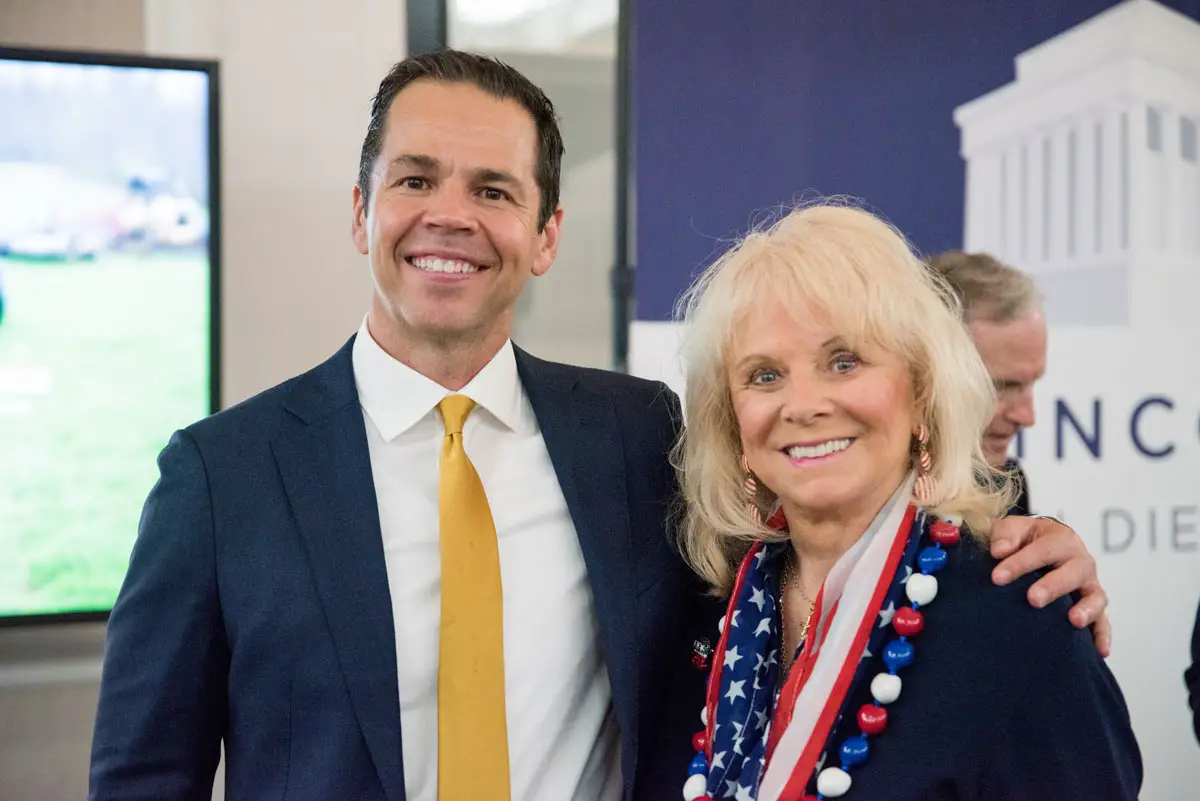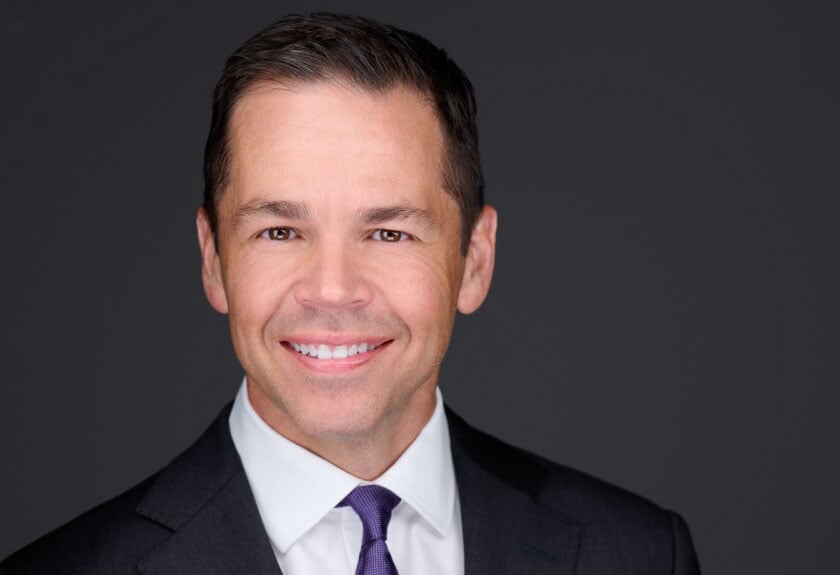ENCINITAS — For state Assembly candidate Dan Downey, his run for office reflects the dissatisfaction of many across the state who feel like the “California Dream” no longer exists for them and their families.
Downey, a Republican, acknowledges that he was a late entry to the 77th Assembly District race, only filing paperwork to run with the state in March. However, Downey says that he felt compelled to launch his candidacy after seeing that incumbent Assemblywoman Tasha Boerner Horvath (D-Encinitas) was running unopposed.
Boerner Horvath has held the district seat since her election in 2018.
“Yeah, I was a late entrance into the race because I saw that Tasha was running unopposed, and I also feel that California has been one of the best places in the country, but the California dream has been slipping away from my standpoint, and that’s why I got in,” Downey said.
Downey — a business owner, entrepreneur and financial advisor from Point Loma — acknowledges that he’s a political outsider but argues the district needs a “new approach” to the office, something that he thinks he brings with his unique background developed from his experiences in the business and investment world.
“My career has been in investments, recommending investments that are going to perform and being focused on the bottom line,” Downey said. “That’s something that could be brought to bear on the state in terms of how the state is run and being results-oriented. People are looking for solutions, and when you’re performing against a benchmark in finance, you tend to be results-oriented, and I’ve always gotten results in my career.”
Noting that he’s running unopposed on the Republican primary side, Downey also expressed optimism that there’s still plenty of time to garner the necessary name recognition with voters needed to make a strong run at the general election.

“One of the benefits I have here is that there are only two of us running in the primary, so normally a late start would be a bad idea, but in this case, I have time to get my name out there, and the primary is an opportunity to do that.
“Once the primaries are done, some Republicans will move on to the general election, and some won’t. Still, the donor community will be much more focused on those who have moved on to the general election. Overall, I do have the luxury of time here because this is not a contested primary.”
Downey also admits that he’s a heavy underdog in the race, given Boerner Horvath’s fundraising and name recognition advantages as an established incumbent. However, Downey argued that national trends of anti-incumbent sentiment would play in his favor heading into the general election.
“She is the favorite; she’s got more money. She’s the incumbent; that being said, we’re in a year with a lot of dissatisfaction with the political landscape, not just in San Diego politics but nationally; we’re in a year where people are looking at alternatives,” Downey said.
Downey also expressed that he feels strongly that Boerner Horvath is not focused enough on the specific policy issues that matter the most to District 77 voters.
For example, he pointed to a bill Boerner Horvath authored in Sacramento that would have allowed bicyclists to treat stop signs as “yield” markers (they would have to decelerate but not entirely stop before a crossing if there was no oncoming traffic). Governor Gavin Newsom ultimately vetoed the bill, and the Los Angeles Times called Boerner Horvath’s measure “nutty” and misguided.
“She’s just focused on the wrong things,” Downey said. “When the LA Times is calling you nutty — and that’s not a conservative publication — that’s not a good sign for you. My take is that she’s not focused on the issues that matter to people in a year where we’re experiencing $6 to $7 gas prices and the highest inflation since the 1970s, there are a lot of real pocketbook issues going on here, and with my experience of seventeen years as a financial advisor I’m uniquely positioned to come into a role like this and provide context and better policy proposal than somebody who is focused on bike lanes and running through stop signs.”
To overcome his funding disadvantage and boost name recognition, Downey said that he’s running an aggressive grassroots campaign, with a strong emphasis on a social media presence, knocking on the voters’ doors, and putting resources towards more traditional mailers and advertising campaigns.
“As far as to name recognition, we don’t have the luxury of money that Tasha has, so we have to be creative in that way,” Downey said. “We’ve hired a consultant to work on that, we have a social media presence with a Facebook page up and running, we’re starting a Twitter and an Instagram, we’re going all-in on raising money, and we’re doing the grassroots stuff too–knocking on doors, and the more traditional mailers and advertising.”
Downey also said he firmly believes that regional redistricting in December has made District 77 more competitive for Republicans, pointing out that the district barely resembles the old 76th that Boerner Horvath previously presided over.
The new 77th, which runs from Carlsbad south towards Imperial Beach and takes in Pacific Beach, Point Loma, Coronado, and swathes of downtown San Diego, is significantly more coastal than the 76th was. According to the thinktank Redistricting Insights, the district holds 41% registered Democratic voters versus 27% who are registered Republicans.
“Redistricting puts me on an equal footing with Tasha; many of these people have never seen her on the ballot before, so her name recognition won’t be as strong as under the old district,” Downey said.
“My take is that San Diego and coastal San Diego, in particular, has a history of being conservative though it’s become more liberal along with the rest of California, compared with places like Los Angeles and San Francisco, this district is pretty moderate, moderate to left-leaning is probably the right way to frame it.”
The national political climate, which some experts say favors Republicans for this midterm year, will also play to his advantage in the general election, Downey said, predicting a sizeable Republican turnout in the district compared to years prior.
“I’d also mention that up until recently, San Diego was in the top ten cities in America with a Republican mayor, and Darrell Issa represents part of San Diego County, so there’s much more competitiveness for Republicans, especially in a year like this where there’s more general dissatisfaction, there are going to be people who voted Republican in the past who it might be easier to sell to than it would be in a place like Los Angeles or San Francisco.”
Cost of Living and Affordable Housing
For Downey, the most important issue going into the general election is finding solutions to the state’s inordinately high cost of living, which he argued is ruining the California Dream. With California losing a congressional seat after the 2020 census due to the state’s declining population, Downey expressed that it’s clear that people are “voting with their feet” in choosing to move to more affordable places to live.
“There’s this idea that’s the California Dream that’s just not attainable to a lot of people anymore…you have our kids and grandkids who can’t afford to get on the housing ladder in California, combined with the highest taxes of any place in the country–I mean we ran a $60 billion surplus last year, and that tells me that there’s a disconnect in California,” he said.
As a legislator, Downey pledged to never vote for any new tax increases and to push for the repeal of the state’s controversial gas tax. He also said that he would go for other policies to lower the cost of living in areas of basic needs such as gas, electricity, and groceries.
“The gas tax should be repealed, especially considering how much gas has shot up,” Downey said. “Income taxes are another one that makes the affordability of this state difficult for a lot of people; that’s one major thing that I’ve been focused on.
“We talk about fees associated with electric bills that’s something that’s becoming more of a focus, those are fees that are imposed by the state, there’s a lot of levers that can be pulled even though it doesn’t happen overnight, but there are things can do from policy perspective improve the cost of living.”
Downey said that tackling questions about affordable housing will also be vital in lowering the cost of living for Californians. For him, solutions to affordable housing involve less regulation and a greater emphasis on local control over housing and zoning ordinances.
Downey made it clear that he opposes Senate Bills 9 and 10 and argued that state and local governments need to do more to lift regulations that make it burdensome for developers to construct affordable units.

SB 9 required cities to allow additional residential units onto parcels zoned for single-dwelling units. SB 10 allows local agencies to adopt an ordinance allowing up to 10 dwelling units on any lot at a specified height if the parcel is within a transit-rich area or urban infill site. Both laws were signed into law last year but faced heavy bipartisan criticism.
“When it comes to affordability, there’s a lot of regulations around building housing that are onerous, and there are certain things that can be done to make the approval process less expensive,” Downey said. “We certainly need to approve new projects while preserving local control; that’s the balance that needs to be struck, necessarily that means that a lot of things have to include municipal governments along with state and county governments.”
Tackling more significant macroeconomic problems such as inflation and the state’s high taxes is the best starting point for making livable housing affordable for the average Californian, Downey opined.
“The dream of home ownership is becoming less and less possible for many people; with interest rates, it’s going to be harder to afford a mortgage, and I think that housing policy is a key part of that. All that stuff takes time; even if you change policies overnight, it doesn’t necessarily translate into more affordable housing tomorrow. Tax policy has a much quicker impact on the cost of living and the longer term need for more housing within reach economically for people.”
Downey also talked about the importance of letting the free market function as it was intended to instead of bringing in what he characterized as an unnecessary governmental overreach into housing policy.
“I’m opposed to things like rent control and other similar policies that we have pursued that seem well-intended, but rent control hasn’t helped the cost of living in San Francisco, for instance; it just picks winners and losers,” Downey said. “It removes units from the open market and drives up the cost for everyone else; we should let the market decide a little more about how much housing we build and lowering regulations that affect the cost of housing. Different municipalities’ approval processes are time-consuming and expensive for developers, so those are the things that I would be looking at as a legislator.”
Homelessness
Downey made it clear on homelessness that from his perspective, the core issue isn’t housing affordability but instead has more to do with mental health conditions and substance abuse.
“When we talk about homelessness, oftentimes we are not necessarily framing it correctly; we need to talk about mental illness and drug addiction,” Downey said. “The kind of homelessness that I see in San Diego, California, I see a lot of mental illness, open drug use, a lot of people recognize that and that’s not to say everyone experiencing homelessness is in that category, but I think that it’s a big big factor.”
To make a serious impact on homelessness, Downey argued that state policymakers need to invest more heavily in combatting the state’s growing opioid epidemic, which he said is not only the state’s leading cause of death but is also responsible for keeping many homeless people trapped in an endless cycle of poverty and addiction.
“The leading cause of death for those ages 18 to 54 in this state is from fentanyl overdoses,” Downey said. “Drugs like fentanyl are one of many, but it has the most dramatic impact on people; it’s multiple times as strong as heroin, it’s very easy to overdose on, and it has a long-term impact on mental health, so yea we need to get more serious as a state about our drug problem.”
Downey said he supports court-ordered diversion programs for those addicted to drugs, as well as Governor Gavin Newsom’s CARE Court initiative launched in March, a new framework that would require counties to provide comprehensive treatment to the most severely impaired individuals while also holding patients accountable to treatment plans.
“It’s neither compassionate nor humane to be left on the streets addicted to drugs, the humane thing to do would be to make sure that they are getting the treatment that they need, and it’s going to be a long process, but we have to start somewhere, and mental illness goes hand in hand with that,” Downey said. “If we can get people into the health care system, we can allow people to get the treatment they need instead of throwing billions at solutions that don’t work.”
Downey also advocated for more investment into shelters specifically focused on helping the homeless transition into long-term housing solutions.
“California has pursued housing first, almost a doctrine that that’s always viewed as the solution to homelessness, but that clearly hasn’t worked,” Downey said. “We’re trying to pursue a solution that doesn’t work quickly enough, and we need to acknowledge that. We need to take more of that money and put it into shelters, they get a bad rap, but they do help people transition from homelessness into long-term housing. We need to focus on shelters and drug addiction treatment and mental health treatment.”
Renewable Energy Solutions
Downey believes that in a heavily coastal District 77, voters are primarily focused on issues of climate change and alternative energy sources to fossil fuels for this election cycle. Across the state, Downey said that he sees voters also becoming increasingly concerned over more frequent electricity blackouts as well.
“I’m reading that we’re expecting more blackouts this summer,” he said. “When the state can’t guarantee continuous electricity, something’s wrong; it shouldn’t happen in an advanced country like the U.S., so we should be pursuing renewable energy.”
As a legislator, Downey says he would advocate for increased independence from fossil fuels, and in particular, for more investment at the state level into nuclear power, which he believes is the future of sustainable renewable energy solutions.

“As an analyst, I spent a couple of years learning about the energy sector, and we’re still highly dependent on fossil fuels,” Downey said. “I believe that nuclear power plays a role for a few different reasons. For one, it’s become much safer over the last generation, and there’s technology that’s going to be rolled out that will be safer even than what we have now. Secondly, it’s not intermittent, whereas solar and wind are intermittent depending on the weather conditions; and third, it’s very cost-effective.”
Downey referenced countries like France that have successfully moved towards reducing their dependence on fossil fuels by investing in nuclear power.
While he’s not opposed to exploring alternatives such as wind and solar, Downey expressed his view that the technology for such renewable sources isn’t where it needs to be right now in terms of cost and overall efficiency to be a reliable energy source for Californians.
“You’ve seen countries like Germany, where similar to California, they went very much away from nuclear towards renewables, and they’ve had problems that we’ve had with blackouts,” he said. “France went nuclear hasn’t had those problems. It’s a matter of being a little more realistic about our options; we can’t transition overnight to 100% renewables.
“I believe that that’s a worthy goal, but there is a transition period where we should consider nuclear power as a viable alternative. Historically, there’s been a lot of opposition to nuclear because of nuclear weapons, but we need to recognize nuclear energy as a different animal. The storage of nuclear waste is pretty safe, it has many advantages compared to fossil fuels, and it’s very cost-effective, so it’s important to keep it in the mix.”
Public Safety and Border Security
As a state, Downey believes California has been too soft on crime and negligent in securing its border with Mexico. He advocates taking more comprehensive measures to prevent illegal crossings, such as finishing areas of fencing and sending the National Guard to the border to deal with large influxes of migrants. Downey said that doing so would better empower local law enforcement to deal with crimes related to unlawful border crossings, such as drugs and human trafficking.
“We have a lot of fencing along the San Diego-Mexico border, but there is a gap from around Tecate to Mesa, and I think that many of the crossings coming into San Diego County happen there,” Downey said. “In an ideal world as a state, I think that there’s a lot more that we could do to control illegal border crossings, that’s where a lot of drugs and human trafficking occurs, and it’s not high on the list of concerns at the moment, but it is something to think a lot more about.
“You have people crossing the border, drugs and human trafficking coming across the border, we’re not taking public safety seriously enough, and that is what is registering on people’s radar streams.”
Downey made it clear he would also push for the repeal of Propositions 47 and 57, which he argued have exacerbated crime and pressure on local law enforcement entities statewide.
Prop 47 was a 2014 voter-approved referendum that reclassified some felonies as misdemeanors with lesser penalties, while Prop 57 (passed in 2016) allowed parole consideration for nonviolent felons and authorized new sentence credits for rehabilitation and good behavior.
“[Prop] 47, in particular, sends such a bad message to criminals…by releasing a lot of inmates during COVID-19, you put it all together, and it sends the message that California is soft on crime,” Downey said. “As someone who studied economics, I can tell you that people respond to incentives. You lower the cost of doing crime, and you will get more crime, and that’s what we’re seeing.
“We need to acknowledge that some of the things we’ve done have sent the wrong message in terms of being soft on crime. I don’t necessarily believe in punishing for the sake of punishing, but those laws are a deterrent to committing a crime, and we should have laws appropriate for the crime committed. As a legislator, I would advocate for repealing these laws [Prop 47 and 57], tougher border security, and treating our homelessness and addiction problem seriously.”




1 comment
It is gratifying that both candidates oppose Senate Bills 9 and 10 and believe in local control over zoning and land use.
Comments are closed.